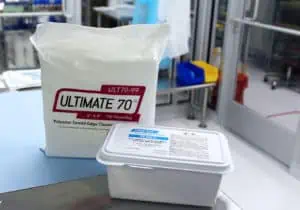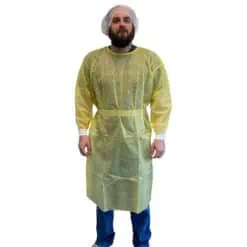Isolation gowns are a form of PPE intended to be used in medium to high-risk applications. If there is a medium to high risk of contamination, this type of gown would be preferred over a surgical gown.
Available in various levels, these gowns are designed to protect the wearer from outside contaminants as well as reduce the spreading of harmful microorganisms. They are commonly used in medical settings to control the spread of bacteria and viruses.
What Makes a Gown an Isolation Gown?
The FDA has designated Surgical isolation gowns as a Class II medical device. Specific requirements set forth by the FDA require this type of garment to have the following characteristics:
- All parts of the surgical isolation gown except for bindings, cuffs, and hems are considered critical zones of protection and must meet the maximum liquid barrier protection level for which the gown is rated
- All seams in the garment must have the same liquid barrier protection as the rest of the gown
- the fabric of the surgical isolation gown should cover as much of the body as is appropriate for the intended use.
Isolation Gown Standards Recognized by the FDA
Level 1
- Used for MINIMAL risk situations
- Provides a slight barrier to small amounts of fluid penetration
- Single test of water impacting the surface of the gown material is conducted to assess barrier protection performance.
Level 2
- Used in LOW risk situations
- Provides a barrier to larger amounts of fluid penetration through splatter and some fluid exposure through soaking
- Two tests are conducted to assess barrier protection performance:
- Water impacting the surface of the gown material
- Pressurizing the material
Level 3
- Used in MODERATE risk situations
- Provides a barrier to larger amounts of fluid penetration through splatter and more fluid exposure through soaking than Level 2
- Two tests are conducted to test barrier protection performance:
- Water impacting the surface of the gown material
- Pressurizing the material
Level 4
- Used in HIGH risk situations
- Prevents all fluid penetration for up to 1 hour
- May prevent VIRUS penetration for up to 1 hour
- In addition to the other tests conducted under levels 1-3, barrier level performance is tested with a simulated blood containing a virus. If no virus is found at the end of the test, the gown passes.
More Reading: Level 1 vs Level 2 Isolation Gowns: What’s the Difference?
Cleanroom Garments


